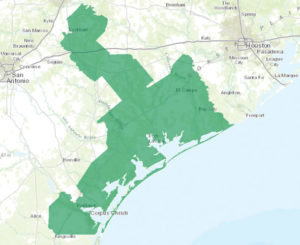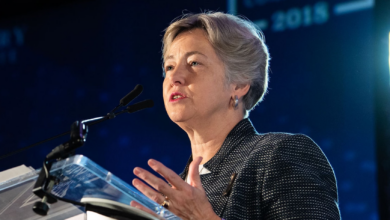
Corpus Christi’s Eric Holguin Vies to Become 1st Out Latino Congressman
Democrat takes on anti-LGBTQ Republican in race for seat vacated by Blake Farenthold.
Editor’s Note: This article is part of “Out for Change in 2018,” a monthly series on LGBTQ candidates in Texas, who were the subject of our January issue. For more, visit tinyurl.com/outforchange2018.
Eric Holguin says a similar scenario has played out at more than one of his campaign rallies this year: while speaking, he notices a young person off to the side or in the back, looking at him nervously. Upon meeting Holguin afterward, the young person says something along the lines of, “Oh my God, you’re LGBTQ? So am I. It’s so weird seeing someone who’s openly LGBTQ run for office.”
 “I came from their neighborhoods; I came from their schools,” Holguin told the Millennial Politics podcast recently. “So a lot of LGBTQ youth—a lot of LGBTQ people in general—are very inspired, because they see someone who is fearless. I don’t really care what people think about me and my sexual orientation.”
“I came from their neighborhoods; I came from their schools,” Holguin told the Millennial Politics podcast recently. “So a lot of LGBTQ youth—a lot of LGBTQ people in general—are very inspired, because they see someone who is fearless. I don’t really care what people think about me and my sexual orientation.”
Holguin, the 31-year-old Democratic nominee in Texas’ 27th Congressional District, will face anti-LGBTQ Republican incumbent Michael Cloud on November 6. If Holguin wins, he will become the first openly gay Latino elected to Congress.
“I’m glad I’m a role model in that way, and I’ll continue to encourage others who are scared to go for something like this because they feel like they don’t fit in,” Holguin said.
The 27th is an oddly shaped district that stretches along Texas’ Gulf coast, and it has an odd history.

First carved out in 1983, it was drawn as a Hispanic “opportunity district.” The seat was held by Democrat Solomon Ortiz, the former sheriff for Nueces County from 1983 until 2010, when Ortiz was defeated by Republican Blake Farenthold by fewer than 800 votes. At the time, the district was 70 percent Hispanic. But after the 2010 census, the district was redrawn to make it more Republican. It is now only about 50 percent Hispanic and includes an arm that snakes toward Houston and its heavily Republican suburbs.
Farenthold was easily re-elected three times until his resignation in April 2018, in the wake of reports he had used public money to settle a sexual-harassment lawsuit. He has said that he would pay back the $84,000, but has not yet done so.
“There were still a lot of congressional decisions being made about Harvey relief in Washington at the time, so [governor Greg Abbott] called a special election to replace Farenthold,” Holguin tells OutSmart. He was one of nine candidates in the June 30 special election, finishing second with 32 percent of the vote to Cloud, who captured 55 percent.
“I don’t really care what people think about me and my sexual orientation.”
Both candidates had already won primary runoffs in May, and they will face off again in the general election.
“The turnout was very low,” Holguin says of the special election. “People were confused. We’d call and they would say, ‘Didn’t we just vote for you?’ Plus, there wasn’t a lot of time to campaign.”
Born to a working-class Tejano family in Odom, Texas, outside of Corpus Christi, Holguin was raised to appreciate education—one of his key issues, along with healthcare, infrastructure, and LGBTQ rights. In college, he ran for a Corpus Christi City Council seat.
“I ran because of brain-drain,” he says. “There are a lot of colleges and universities in South Texas, but there weren’t jobs for these young people when they graduated.” In fact, after graduating from Texas A&M University-Corpus Christi, Holguin moved to New York to find work as a talent agent. But it wasn’t long before the lure of public service came calling. He went to work for Democratic congresswoman Carolyn Maloney (who recently endorsed Holguin) and later for the New York City Comptroller’s Office.
During his stint in New York, Holguin helped organize an effort involving a group of global investors who sent a letter to Texas Republican leaders warning about the potential economic impacts of passing an anti-transgender bathroom bill.
“After the 2016 elections, I knew I needed to do more,” Holguin says. So he moved back to Corpus Christi and prepared to run for Congress himself.
With just two paid campaign staffers, Holguin says he is running a grassroots campaign with lots of postcards and knocking on doors. “And we don’t take PAC or corporate money. It’s all three-, five-, and ten-dollar donations.”
But even with his busy campaign schedule, Holguin says he finds time to run four to five miles every day.
“It helps clear my head—and helps with all the barbecue and tacos people keep feeding me on the trail,” he says.

Cloud has received support from the conservative economic advocacy group Club for Growth. Although that group is not openly anti-LGBTQ, it supports many Republican candidates who are. On his campaign website, Cloud lists “religious liberty” and “family values” among his top issues, alongside the Second Amendment and border security.
“The essential building block of a healthy, productive society is the family. Yet political forces are at work to discriminate against and destroy this sacred institution,” Cloud writes. “We need Representation that recognizes the essential role of the family—and works to
enact policies that recognize parental rights, respect marriage, and protect life.”
Cloud didn’t respond to a request for comment. Despite Cloud’s anti-LGBTQ views, Holguin says his sexual orientation has not yet come up.
“It’s 2018. I think people are more accepting,” he says. “It hasn’t been an issue—not once in this campaign.”
Cloud’s site also states that he wants to repeal the Affordable Care Act.
“Access to healthcare is one of the things I’m hearing on the campaign trail—also, education,” Holguin says. “But the top two issues are jobs and Harvey recovery. In some parts of South Texas, it’s as if the hurricane was yesterday.”
Holguin says he’s been encouraged by conversations he’s had with Democrats on the national level.
“They think it’s winnable,” he says of the district. “I don’t think I would have gotten into it if I didn’t think the timing was right for a Democrat.”
In another sign that the district is in play in 2018, President Trump’s re-election campaign contributed the maximum amount allowed to Cloud’s campaign in July.
Holguin thinks the district is more blue than red, but Democrats haven’t been showing up to vote. He’s hoping that by reaching out to Hispanics and millennials, he can change that.
“As much as we are all Texans, we are very diverse, and the best part of this has been getting to meet people and hear their stories,” Holguin says. “I’ve always been a fan of biographies, and I love learning about people’s histories.
“I was at an event in Victoria, and a man came up to me and wanted to shake hands, but with his left hand,” he recalls. “And he showed me the watch he was wearing on his left wrist, and said it was his son’s watch. He said I reminded him of his son, and that his son would have voted for me.”
Holguin is one of three openly LGBTQ congressional candidates in Texas who will be on the ballot in November. The others are Lorie Burch in District 3, and Gina Ortiz Jones in District 23. The state has never elected an openly LGBTQ member of Congress.
This article appears in the September 2018 edition of OutSmart magazine.










